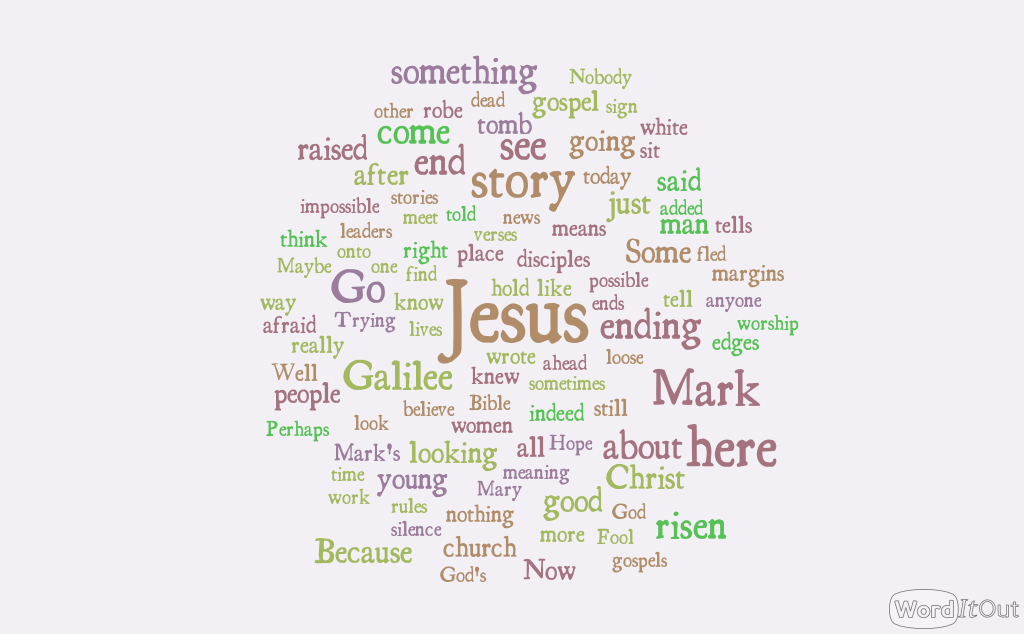This is an adapted form of the sermon I preached on the Resurrection of Our Lord, Easter Day, April 1, 2018. The gospel reading was Mark 16:1-8.
So [the women] went out and fled from the tomb, for terror and amazement had seized them; and they said nothing to anyone, for they were afraid. – Mark 16:8, New Revised Standard Version
Well, that was an odd ending, wasn’t it? The story is familiar. Easter morning, and Mary, Mary, and Salome go to the tomb. They meet a young man dressed in a white robe. He tells them, “Jesus has been raised; go, tell the disciples. But then the ending. “So they went out and fled from the tomb; and they said nothing to anyone, for they were afraid.” The end.
Seriously? Let me try to finish this story myself. Check this out. “Then the young man ran after them, calling out, ‘April Fool!’ The women stopped and turned to him. The young man said, ‘Yea, verily, I was merely tricking you. Jesus’ body is here. Come back, and bring your spices. Boy, I got you good, didn’t I!’ The end.”
Okay, that’s not a good ending either. But there’s something so unsatisfying about Mark’s ending, isn’t there? People have wondered for centuries why it ends like this. Because this isn’t only the ending of this story, this is the end of Mark’s entire gospel. “They said nothing to anyone, for they were afraid.” The end.
Now there are plenty of stories in the gospels about Jesus after the resurrection. Remember the story of doubting Thomas? John tells us that one. How about when Jesus met two disciples on the road to Emmaus? Luke tells us about that. Or that time when Jesus said, “Go therefore and make disciples of all nations?” Matthew. Three of the four gospels tell us beautiful stories of the risen Jesus. But not Mark. For Mark, just silence, for they were afraid. Now if you look in a Bible, you will see that there are more verses in Mark after that. But those verses were added long after Mark wrote the gospel. They were added by scribes in the early church who didn’t like his ending. But I think Mark meant to end it the way he did. And all joking aside, I love the way this ends.
Because it’s our story, and because it’s impossible. It’s impossible, because if these women really told nobody, then how did Mark himself find out? How could he have written this? Well, honestly, one option is that Mark was just writing a story, and he liked the way this ending sounded. It’s possible. It’s possible the whole Bible is nothing but fiction. Just a good story with no real meaning. But then why are we here? You don’t come to worship just to hear a good story. No, you come to worship because you believe there’s something else, something more going on here. Or perhaps you’re not sure that you believe that, but you hope. Hope that there might be some meaning. Some forgiveness. Some direction. Some holiness. Something. Whether you come every week, or this is your annual visit, you come here looking for something more than a story.
And I think maybe what you’re looking for is Jesus. Maybe you’re looking for some sign that this Jesus, this Jesus who was crucified…and was raised from the dead, really means something today. Some sign that Jesus really does offer something. That it’s worth our time to meet him. Perhaps you come here hoping for that.
So, you’ve come here today looking for Jesus. He’s not here. He has been raised. And that means he doesn’t sit still. He didn’t sit still in the tomb, and he doesn’t sit still in the church. Oh, I know, sometimes we think the church is the place where God lives. Pastors and other church leaders, we can sometimes fool ourselves into thinking that God follows all our rules, that God’s work fits neatly into our committees and our schedules and so forth. That God’s a good Lutheran. But Jesus isn’t here. Jesus has been raised from the dead, and that breaks all the rules. He is on the loose. He’s out there. Trying to hold onto him is like trying to hold onto the wind.
Did you see what I did there? You came here looking for Jesus, and a young man in a white robe, well, young-ish anyway, just told you he’s not here, he’s been raised. [Reader, I was wearing a white robe while I preached this.] This is the story Mark wrote. This is the ending of Mark’s gospel, right here, right now. We are in the story.
Mark knew that when he wrote this. He knew that we would struggle with it. That we would say, “Hold on. A gospel can’t end with silence.” Mark says to us, “Yeah. That’s right. Now what are you going to do about it?”
Jesus isn’t here. He’s been raised. He’s out there. What are you going to do about it? Jesus is out there, and he’s out there to be found. If you look for him, you will see him. The young man in the story said, “He’s going ahead of you to Galilee. There you will see him.” Galilee is the place where Jesus started his ministry. The region of Galilee was on the very edges, the margins of society. Nobody cared too much about Galilee. But Jesus did. Galilee is the place where Jesus healed people. Where he taught people. Where he proclaimed the good news. Where he forgave people. Where he annoyed the religious and political leaders, and comforted those who were at the bottom. “He’s going ahead of you to Galilee. There you will see him.”
Jesus is out there, at the edges. On the margins. Healing. Teaching. Proclaiming. Forgiving. Annoying. Comforting. Go there, go to Galilee, and you will see him. Where are the Galilees you encounter in your lives? In your family? At your work? At school? In the news? Where are the edges? Where are the margins? Go there, and you will see him.
Christ is risen. Christ is risen indeed.
Christ is risen. Christ is risen indeed.
Christ is risen. Christ is risen indeed.
He is risen, and that means that he is on the loose. Go from here, go to Galilee, and find him. And when you do, tell each other what you see. I know you will. Because I know the women did, after they fled the tomb. They must have. Mark knew the end was not the end. It was just the beginning. And it begins again today. Go, see Jesus.

Featured image is a Word Cloud of the text of this sermon, made at WordItOut.com




Leave a comment